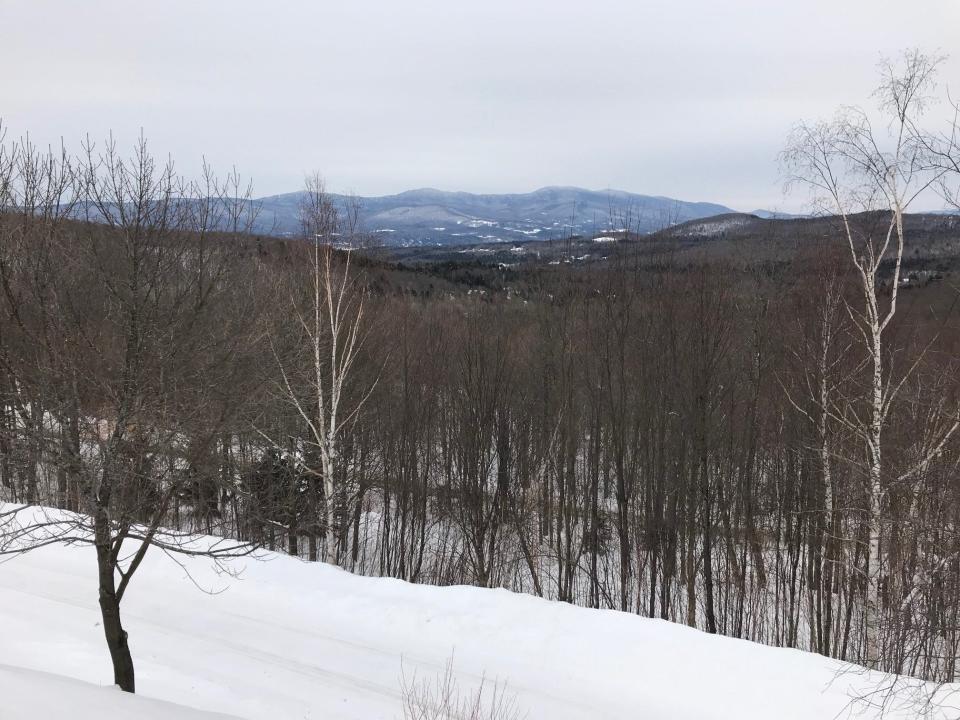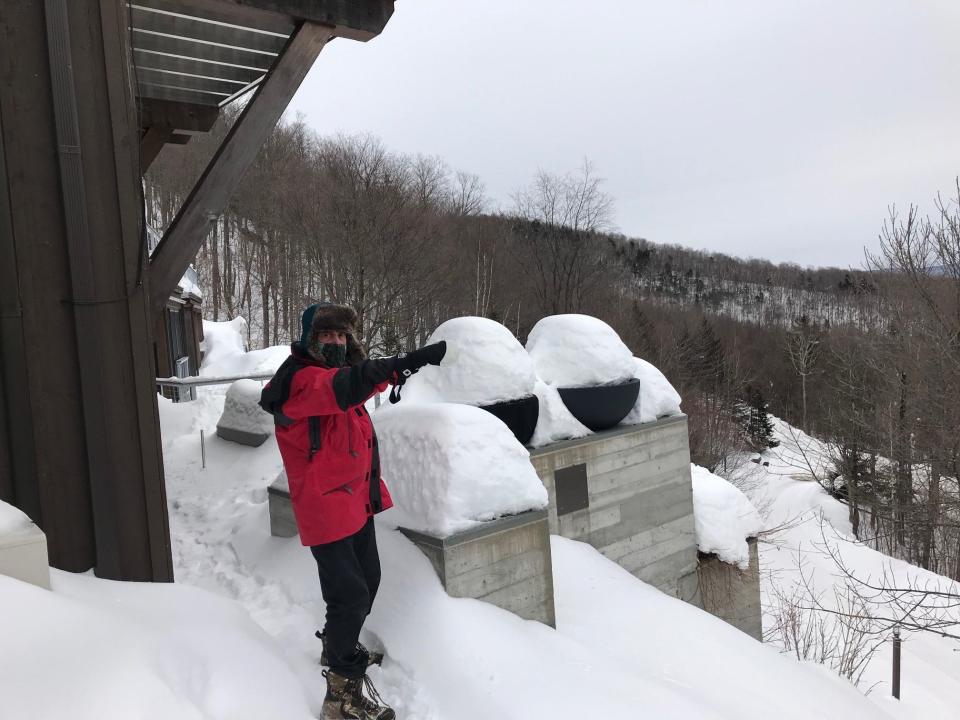Vermont vs. vacation rentals: New bills aim to regulate Airbnbs, end party houses
STOWE, Vt. – Bob Poole noticed the traffic first.
Poole and his wife bought a house on Stowe's Bull Moose Ridge Road in 2014 because of the solitude. Poole, a former executive editor of National Geographic magazine, spent four decades working in the Washington, D.C., area. Vermont was his Nirvana.
"My wife and I both loved it here," Poole said. "We started looking around. We found this place and made plans to sell everything in Virginia and move here. The big attraction was the quiet."
One example: Every spring the woodcocks would put on a dramatic show of mating rituals just across the narrow dirt road from Poole's home. On a busy day, three or four cars might pass by. There are only nine houses on the private road, marked by a custom wooden sign.
Then, in 2018, everything changed.
"When the trouble started, the first thing I noticed was the traffic, mainly on weekends, a parade of cars blasting back and forth, making clouds of dust," Poole said.
'Summer people': Greensboro is ground zero for the fight over short term rentals

Poole quickly realized the destination for this parade of cars was his next-door neighbor, about 300 yards up the road.
"We realized this was an Airbnb being rented as a party house," he said.
Short-term rentals like Airbnb have been a magnet for controversy across the country, including in Vermont, and not just because they sometimes turn into party houses.
Why are short-term rentals bad?

There are currently bills in both the Vermont House and Senate to address other issues related to short-term rentals, including health and safety concerns.
Those concerns were brought to the forefront by the COVID-19 pandemic. No one knows how many short-term rentals are in the state, who owns them, or how often they're rented. Tim Piper, co-chair of the Vermont Lodging Association, estimates there are as many as 6,800 unlicensed short-term rentals in Vermont.
When the pandemic hit, the state realized it had no way to contact the owners of those rentals to make sure they were following the same rules as the rest of the hospitality industry, including quarantining and shutting down completely for certain periods.
"There are intense public health implications for an unregulated party house in the middle of a pandemic that makes all this feel more urgent," said Vermont Rep. Emilie Kornheiser, D-Brattleboro, one of the sponsors of the House short term rental bill.
Don't ask us not to party

The music was loud, blasting from speakers on the deck at a home, just up the road from Bob Poole.
"I walked up the road a couple of times and asked them to turn it down," Poole said. "They didn't appreciate some old crackpot from down the road asking them not to party."
As soon as he returned to his house, the music would be cranked up again. Poole called the cops. The same scenario played out. Turn it down when the cops come. Turn it up when they leave.
Across Vermont, variations of this theme play out as short-term renters are drawn to some of the state's most scenic and iconic locations by Airbnb and other rentals.
"Just beyond this neighborhood I can't tell you how many people I've heard in this area, which relies on tourism, who have this problem, all over Stowe," Poole said. "I'm sure all over Vermont."
The owners of the party house – Scott and Ann McCready of Harvard, Massachusetts, and their son Anders – got a restraining order against Poole to keep him from going on their property. The only problem? He never went on their property.
"I said in court, 'I've never met either of these gentlemen, father and son, in my life, never seen them or talked to them because they're not available to talk to,'" Poole explained. "I stayed in the road and called somebody to the road. I never set foot on the property."
Can you help me out of this ditch, bro?

Poole never met the McCreadys because they were never there, said Poole's friend and neighbor, Mike Krancer. Krancer lives at the summit of Bull Moose Ridge Road, in a rambling, contemporary house named Mount Haven.
The all-encompassing view from Mount Haven is spectacular, taking in the entirety of this mountain valley from its deck. Far below, the party house, a red, lodge-like structure that Krancer points to, is difficult to see from such a distance. It's not, however, difficult to hear, he said.
"We had a direct line of audibility," Krancer said. "When they played the music, oh my god, yeah."
The valley acted as a natural amphitheater, gathering the sound up and delivering it to Mount Haven.
In the winter, the party animals caused another problem. They got stuck a lot, trying to drive the narrow, snow-covered road in their ill-suited cars. Another of Krancer's friends who lives on the road, Bill Wengel, would have to rescue them.
"Billy would have to pull them out," Krancer said. "He's Vermont true and true, born here, and knows how to pull them out of the ditch."
What counts as a short-term rental?

Both the Vermont House and Senate bills are designed to rein in short-term rentals and impose on them the same rules and regulations that govern commercial inns and hotels.
Kornheiser's bill, as well as the Senate bill, calls for the creation of a short-term rental registry, with the names and contact information of everyone who owns such rentals in the state.
Kornheiser said the registry is important both for "health and safety reasons" related to COVID-19, but also to provide "technical assistance" from a tourism perspective.
The second aspect of Kornheiser's bill is a residency requirement for owners of short-term rentals. This is intended to address the problem of affordable housing in Vermont, by preventing people from buying properties and renting them out as short-term rentals rather than living in them or turning them into long-term rentals.
"It has a big impact on the rental market and the community if you have houses with people living in them without permanency," Kornheiser said. "It gives a really transient, unstable feel to a neighborhood."
Kornheiser said she doesn't want to interfere with people renting a room or two in their houses through Airbnb as a way of paying their mortgages or their property taxes.
"There has to be a way of balancing the needs of people in homes trying to make ends meet, and folks engaged in the tourism economy, but not regulated," she said. "If you want to be in a non-regulated category called short-term rentals, you need to live in the home you're renting."
Conversely, if you want to rent out a home you're not living in on a short-term basis, more power to you, Kornheiser said, but you need to follow the same rules governing Vermont's hotels and B&Bs.
Noxious or offensive activity not allowed
Krancer sued the McCreadys in Vermont Superior Court in Lamoille County for violating the covenants and conditions of the nine-lot subdivision known as Bull Moose Ridge Properties. One of the restrictions is to use the lots for "residential purposes only." Another is a prohibition against "noxious or offensive activity."
On Aug. 22, 2018, Judge Thomas Z. Carlson ruled in Krancer's favor and gave the parties six days to work things out. If not, he would work it out for them.
Carlson found that since buying the property in June 2017, the McCreadys had rented it out at least 20 times – at a cost of $1,000 per night – to short-term tenants.
"As of August 2018, they are advertising the property on Airbnb as 'Bull Moose Lodge' with 8 bedrooms, 16 beds, 5 baths and room for '16+' guests," Carlson wrote.
Carlson noted that the defendants had "offered no evidence as to their own use and occupancy of the property."
Krancer, a former litigator, had a few questions of his own for the defendants during the discovery process of the civil litigation. Eighty-six questions, actually, including "What are you telling the Internal Revenue Service you're using the property for?"
"Mike is a great lawyer and a good guy," Poole said. "He's not a guy you want to pick a fight with. He's like a Jack Russell terrier. He doesn't let go."

Soon, Krancer received an overture from the McCreadys, looking to settle. They offered to put the house on the market.
"I said 'No, that's certainly not good enough because you'll keep renting,' " Krancer said. "And if you put it on the market, you could put it on at a price that would never get a bite.' "
The solution turned out to be Krancer buying the house himself, for about $900,000. He lets friends and family use it – quietly – and has no plans to sell it or rent it.
Clearly, not everyone can handle a party house problem the way Krancer and his wife did. All the more reason Vermont needs more robust rules and regulations governing short-term rentals, according to state Sen. Michael Sirotkin, D-Chittenden.
Sirotkin is leading the effort in the Vermont Senate to regulate short-term rentals.
"As this short-term rental platform becomes more prevalent – and it's growing very fast – we need greater enforcement and inspections over them," Sirotkin said. "We have to know for certain where and who they are."
Contact Dan D’Ambrosio at 660-1841 or ddambrosio@freepressmedia.com. Follow him on Twitter @DanDambrosioVT. This coverage is only possible with support from our readers.
This article originally appeared on Burlington Free Press: Vacation rentals: Vermont tries to stop party houses, control COVID

 money
money 